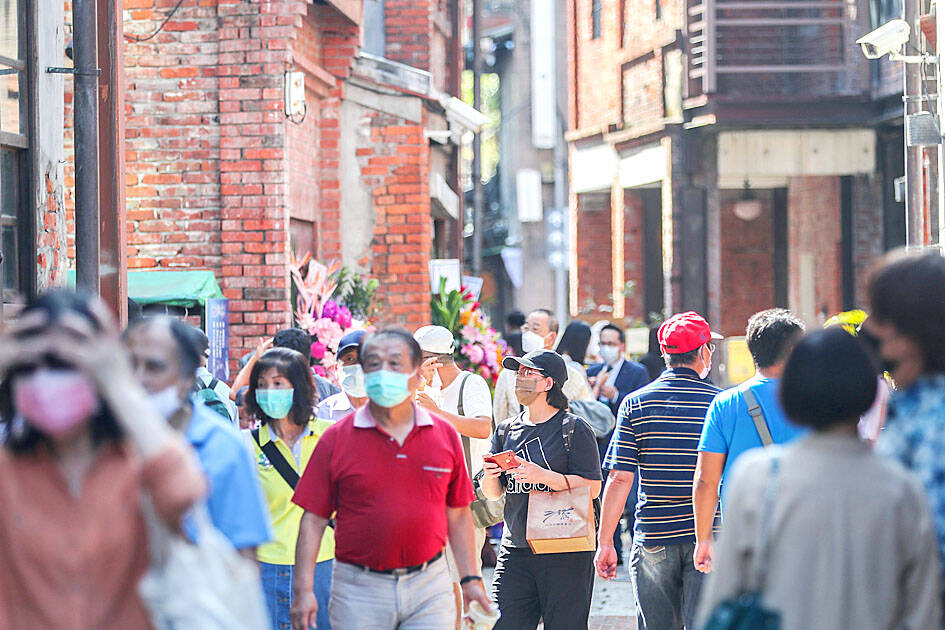The domestic mask mandate for COVID-19 prevention would not be lifted in the next few weeks, but it might be eased in November at the earliest, the Central Epidemic Command Center (CECC) said yesterday, as it reported 46,608 new local cases.
The Chinese-language Mirror Media yesterday published an interview with Deputy Minister of Health and Welfare Victor Wang (王必勝), who heads the CECC, in which it reported that the mask mandate might be eased in November if daily local caseloads are consistently low.
At a CECC news conference, Centers for Disease Control (CDC) Deputy Director-General Philip Lo (羅一鈞), deputy head of the CECC’s medical response division, said that as the local outbreak of the Omicron BA.5 subvariant of SARS-CoV-2 is still at a peak, the mask regulations would not be revised much in the next few weeks to help prevent overwhelming Taiwan’s healthcare capacity.

Photo: CNA
The CECC regularly reviews COVID-19 restrictions, referencing the policies in other countries and discussing how restrictions can be gradually lifted, including easing mask rules in outdoor and indoor settings.
As to whether the mandate might be eased in November, Lo said it is not certain at this point.
However, the CECC would pay close attention to the local COVID-19 situation after quarantine requirements for people arriving in Taiwan are scrapped from next month.
CDC Deputy Director-General Chuang Jen-hsiang (莊人祥), the CECC’s spokesman, said that 45,608 new local cases, 242 imported cases and 28 deaths were confirmed yesterday.
The daily caseload in the nation increased by 2.5 percent from Tuesday last week, he said, adding that BA.5 cases are still at a plateau.
New Taipei City reported the highest number of cases, with 9,019, followed by Taichung (with 6,154), Taipei (5,125), Taoyuan (4,220), Kaohsiung (4,186), Tainan (3,033), Changhua County (2,418), and fewer than 1,300 cases in the 15 other administrative regions.
Meanwhile, Lo said that after the CECC last week announced plans to lift border control measures, some frontline healthcare workers have asked if they would be allowed to travel abroad.
The temporary ban on overseas travel for healthcare workers was lifted on July 1, 2020, and the rule has not been in place since then, he said.
Healthcare workers have not traveled abroad much because of high demand at health facilities during the pandemic and because of the quarantine requirements on their return, he added.
After the “0+7” rule — no days of quarantine and seven days of “self-disease prevention” — is implemented, possibly on Oct. 13, healthcare workers would be allowed to go to work if they test negative seven days after returning to Taiwan, he said.

Taiwanese actress Barbie Hsu (徐熙媛) has died of pneumonia at the age of 48 while on a trip to Japan, where she contracted influenza during the Lunar New Year holiday, her sister confirmed today through an agent. "Our whole family came to Japan for a trip, and my dearest and most kindhearted sister Barbie Hsu died of influenza-induced pneumonia and unfortunately left us," Hsu's sister and talk show hostess Dee Hsu (徐熙娣) said. "I was grateful to be her sister in this life and that we got to care for and spend time with each other. I will always be grateful to

REMINDER: Of the 6.78 million doses of flu vaccine Taiwan purchased for this flu season, about 200,000 are still available, an official said, following Big S’ death As news broke of the death of Taiwanese actress and singer Barbie Hsu (徐熙媛), also known as Big S (大S), from severe flu complications, the Centers for Disease Control (CDC) and doctors yesterday urged people at high risk to get vaccinated and be alert to signs of severe illness. Hsu’s family yesterday confirmed that the actress died on a family holiday in Japan due to pneumonia during the Lunar New Year holiday. CDC Deputy Director-General Tseng Shu-hui (曾淑慧) told an impromptu news conference that hospital visits for flu-like illnesses from Jan. 19 to Jan. 25 reached 162,352 — the highest

TAIWAN DEFENSE: The initiative would involve integrating various systems in a fast-paced manner through the use of common software to obstruct a Chinese invasion The first tranche of the US Navy’s “Replicator” initiative aimed at obstructing a Chinese invasion of Taiwan would be ready by August, a US Naval Institute (USNI) News report on Tuesday said. The initiative is part of a larger defense strategy for Taiwan, and would involve launching thousands of uncrewed submarines, surface vessels and aerial vehicles around Taiwan to buy the nation and its partners time to assemble a response. The plan was first made public by the Washington Post in June last year, when it cited comments by US Indo-Pacific Commander Admiral Samuel Paparo on the sidelines of the Shangri-La Dialogue

Suspected Chinese spies posing as Taiwanese tourists have been arrested for allegedly taking photographs of Philippine Coast Guard ships, local media reported. The suspected spies stayed at a resort in Palawan, where from a secluded location they used their phones to record coast guard ships entering and leaving a base, Philippine TV network GMA said on Wednesday. Palawan is near the Spratly Islands (Nansha Islands, 南沙群島) and other disputed areas of the South China Sea, where tensions have been on the rise between China and the Philippines. The suspects allegedly also used drones without permission and installed cameras on coconut trees in the